
How To Scrape Glassdoor Reviews Using Intelligent Tools?
Did you know that Glassdoor, with its 67 million unique visitors on its website and mobile apps, holds a wealth of information that can empower you to understand the job marketplace? From job listings to salary data, company reviews, and the latest trends, this data can equip job seekers and businesses with valuable insights.
This content will share strategies for scraping Glassdoor reviews using scraping tools and programming. Whether you are interested in conducting sentiment, performance, or competitor analyses, we will explore different segments managed by the Glassdoor review scraper. By scraping Glassdoor reviews, you can gain valuable insights into job listings, salary trends, company culture, and employee satisfaction, which can be used to inform job applications, business strategies, and research projects.
What Is Glassdoor Reviews Scraping?
Web scraping Glassdoor reviews is the procedure of extracting data from the target sections. This is typically done by sending HTTP requests to the Glassdoor website, parsing the HTML response to extract the desired data, and storing it in a structured format for further analysis. Multiple automated tools, APIs, and custom methods handle the scraping process. It will scrape target information from the website, store it in a readable format, and analyze data efficiently.
Here Is The List Of Data That Can Be Extracted From Glassdoor:
● Business Details: The platform has extensive information about companies like size, industry, revenue, overall ratings, and location.
● Interview Experience: Users can also extract data about interview questions and suggestions, which helps job seekers understand the complete process beforehand and prepare accordingly.
● Job Listings: They are famous for people looking for jobs, and scraping this information lets you understand the demands of different industries.
● Reviews and Ratings: The platform enables current and past employees to post reviews and company ratings. They might share their experience about company culture, employees, leadership, and employee satisfaction.
● Salary Data: This might provide valuable salary and compensation offered in a company. It might include average salaries for different job roles in the market with its benefits and perks.
How To Scrape Glassdoor Without Coding?
For those who prefer a more straightforward approach, primary data from Glassdoor can be obtained without the need for coding. Review scraping services are readily available to handle this method, making the process more accessible and user-friendly.
● Find Web Scraping Tool: Multiple free and paid Glassdoor reviews API, and scraping tools are available on the market. Use the one that meets all or majority of your requirements.
● Create Account: Follow the registration process on the chosen tools if required to start the process.
● Shortlist Glassdoor Data: Choose the Glassdoor information to scrape and follow the standards mentioned on the website, especially the Robots.txt.
● Web scraping tool: Start setting up the scraping tool for extraction. Define website elements and define the rules.
● Data Storage: Once the data scraping process is completed, the information should be stored in a structured format that is easy to analyze.
How To Scrape Glassdoor Reviews Using Beautifulsoup, Selenium, And Pandas?
1. Required Libraries And Tools
First, You must install the following resources before you start scraping Glassdoor reviews:
● Pandas: Pandas is a library that manages data manipulation and analysis and organizes extracted information.
● Requests: A simple HTTP library that makes requests to the target platform.
● Selenium: This tool controls web browsers using programming and automates browser tasks.
● BeautifulSoup: A library used to parse HTML and XML documents efficiently.
2. Installing Libraries
Coding Source: https://www.actowizsolutions.com/scrape-job-listings-from-glassdoor-using-python.php

3. Selenium Set Up
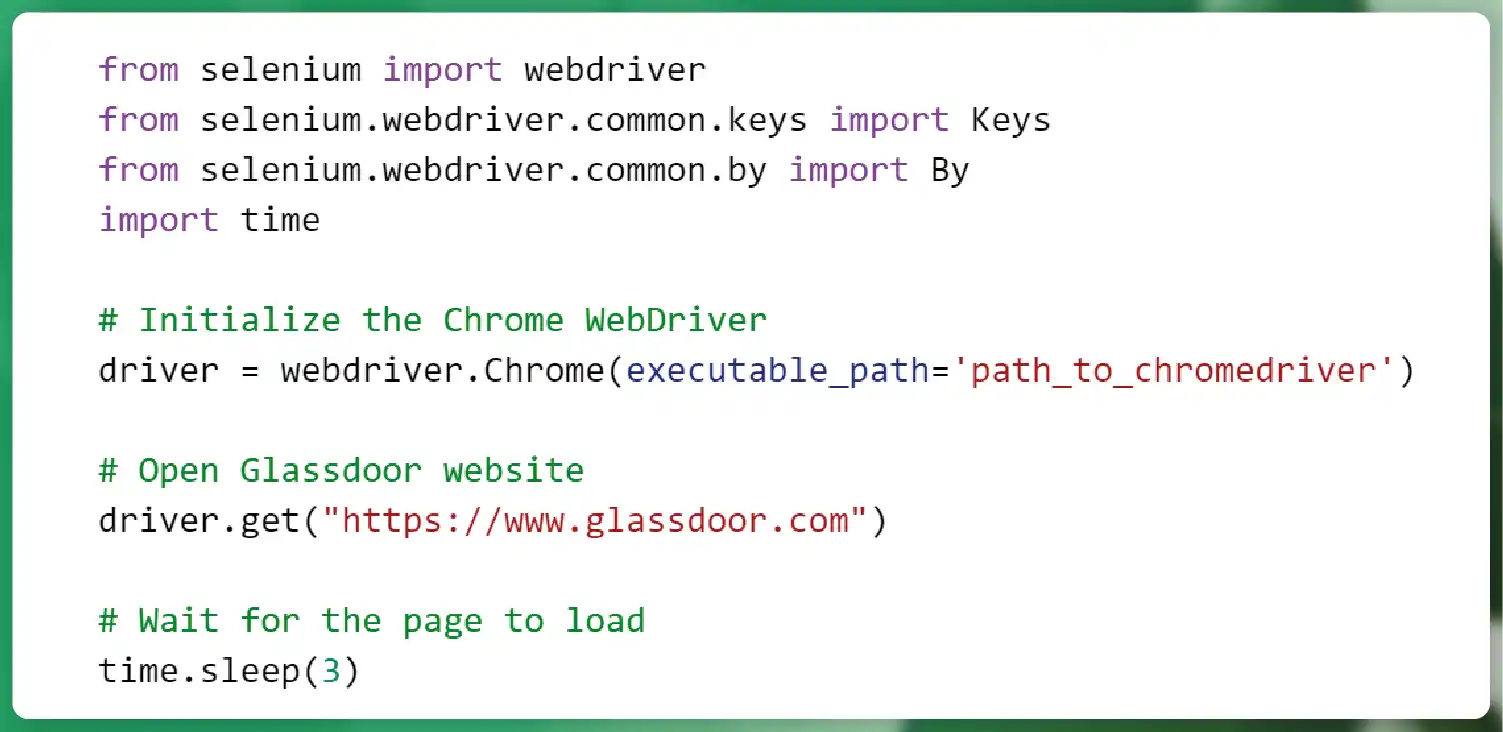
4. Glassdoor Log-In Process
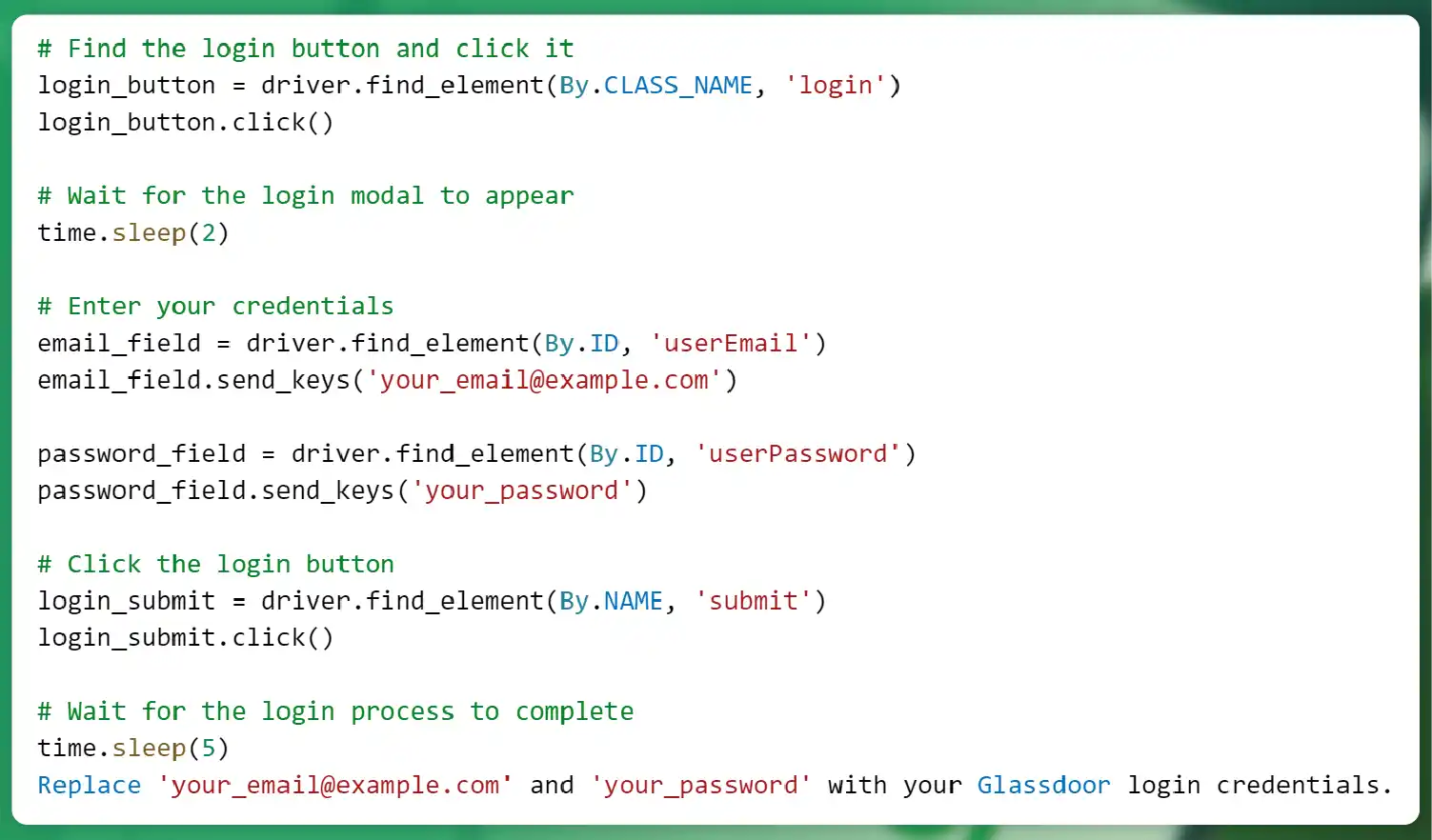
5. Redirect To The Job Listings Page
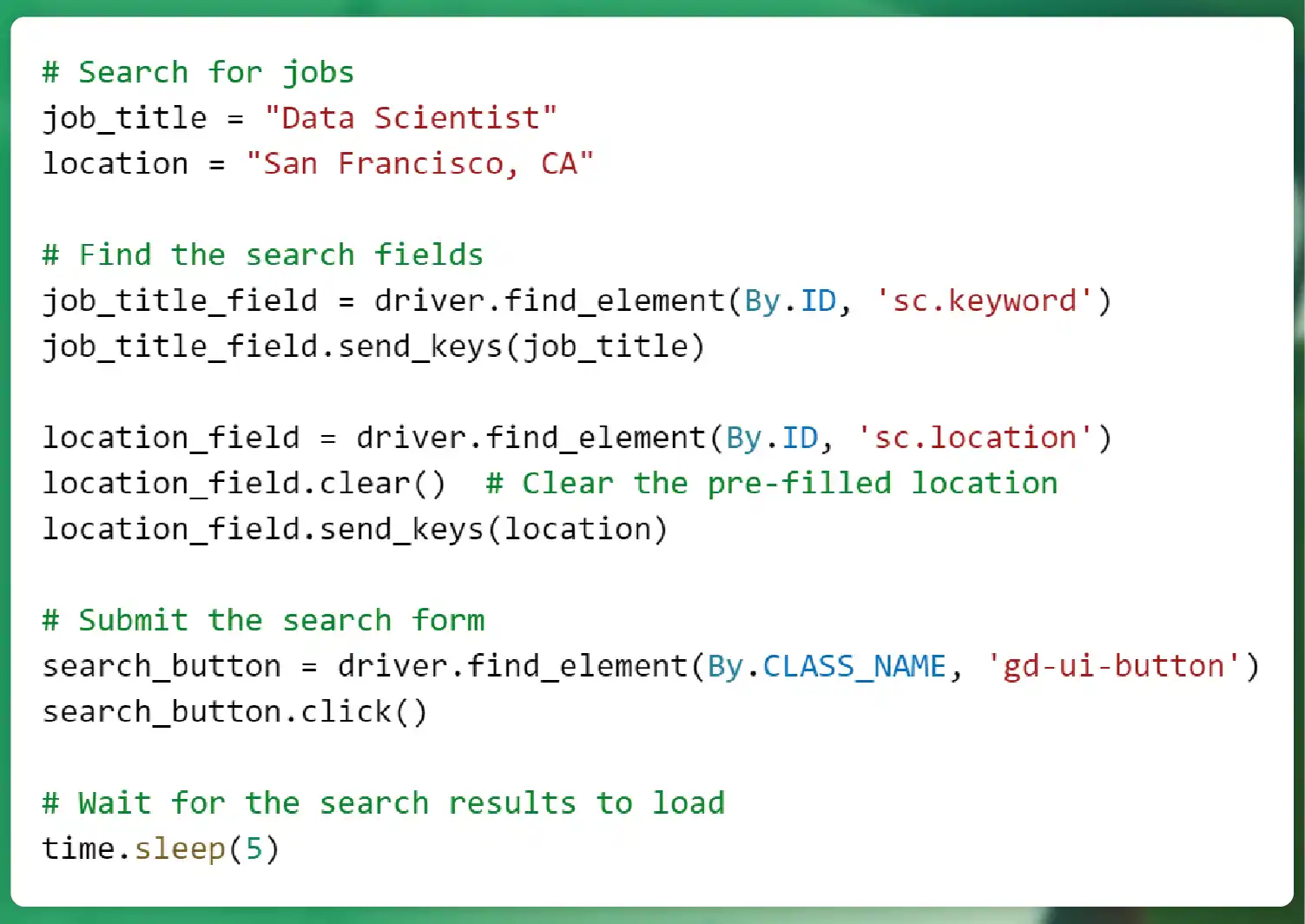
6. Glassdoor Job Listing Extraction
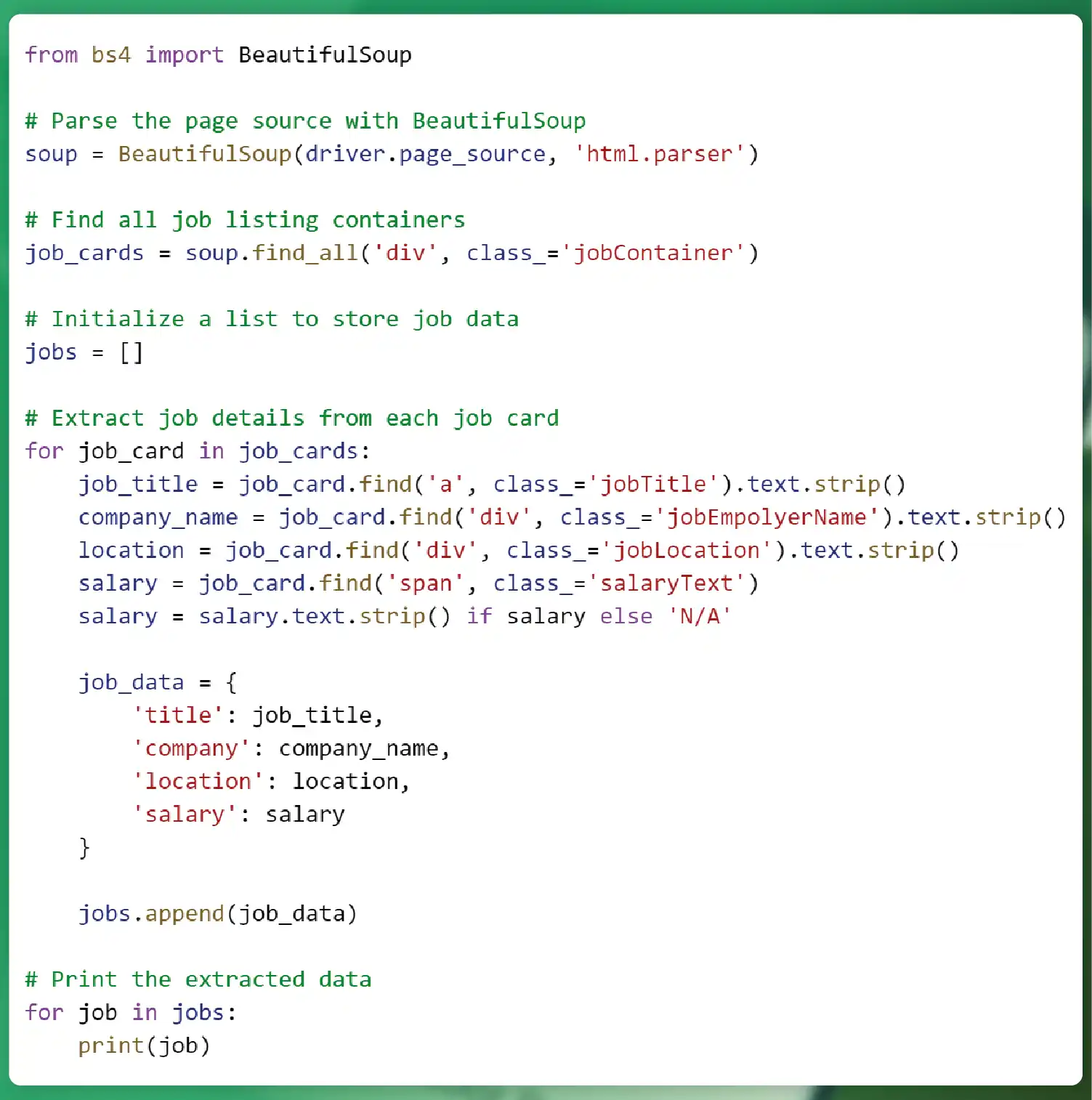
7. Structuring Data Using Pandas
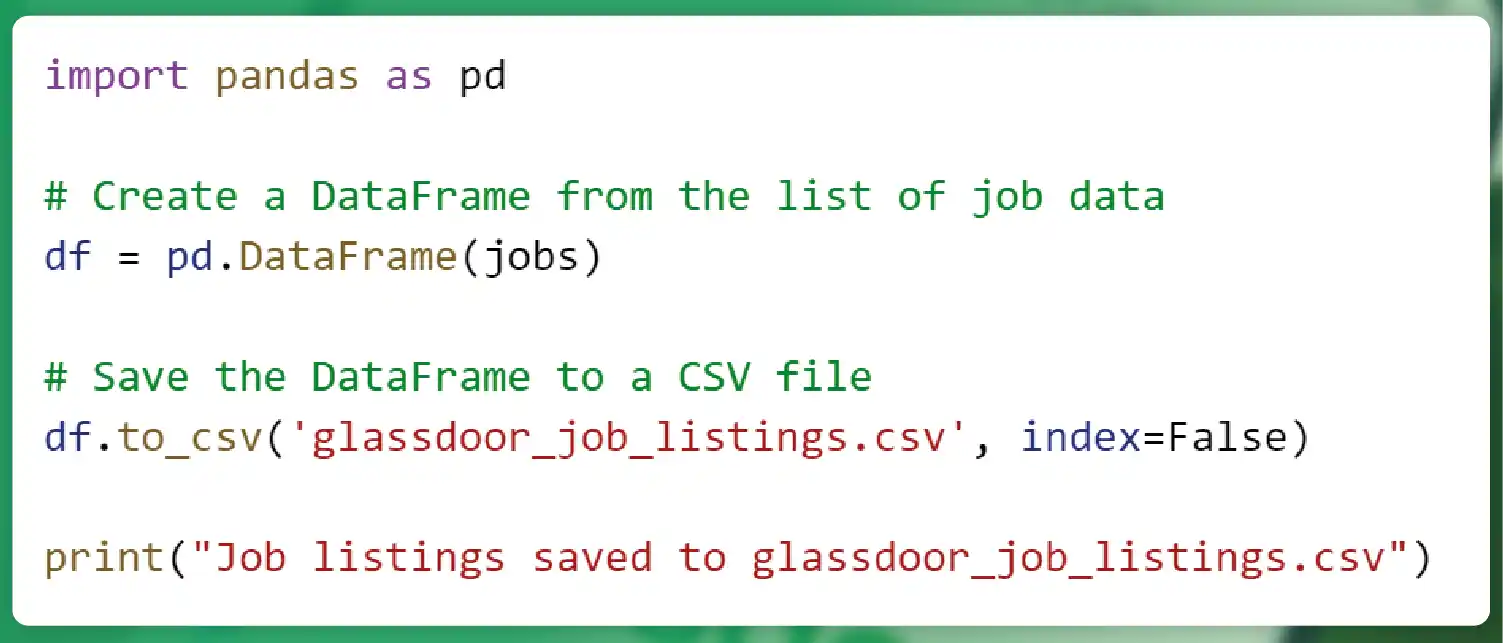
8. Manage Pagination
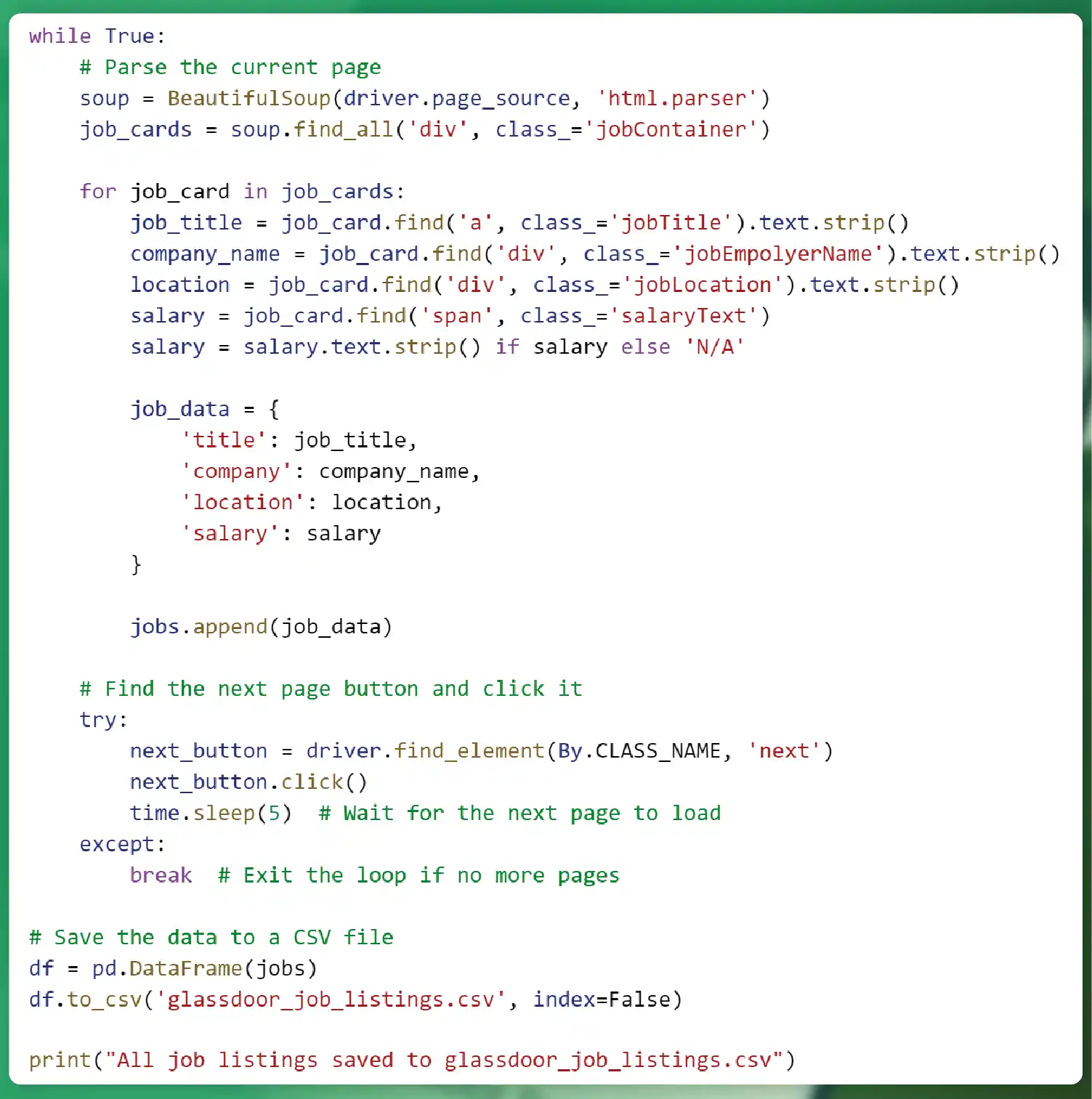
What Are The Use Cases Of Scraping Glassdoor Reviews?
The process brings job seekers and companies opportunities to handle their requests. Glassdoor review scrapers can help job seekers find job listings and understand company culture, which can be crucial in making informed decisions about job applications. For companies, it can provide insights into employee satisfaction and industry trends, which can be used to improve workplace conditions and competitive positioning. Let us look at some use cases:
Salary Analysis
Most job seekers often scrape Glassdoor reviews to find the ranges of specific job roles across various locations and industries. Companies look for the salary range for particular positions and offer the right amount to their employees.
Academic Research
People in the economic, social sciences, and management might scrape Glassdoor for their research work. This extracted data has become helpful, be it corporate governance, organizational behavior, or labor economics.
Competitive Analysis
Businesses will use data extraction services to analyze employee satisfaction, workplace culture, and industry competitors’ benefits. Then, they focus on improving their workplace to retain employees and provide them with an ideal work life.
Improve Reputation
Companies can gather reviews and ratings to understand their weaknesses and strengths. This allows them to enhance their brand reputation by working on their weaknesses.
Recruitment Purpose
Talent acquisition and recruiters will invest in Glassdoor data scraping to find companies with higher retention rates or lower targets. This gives them a window to find talented employees.
Legal And Ethical Considerations In Glassdoor Reviews Scraping
Ensuring a secure and penalty-free web scraping experience is crucial. By following these general tips, you can navigate the legal and ethical considerations of Glassdoor reviews scraping with confidence and peace of mind.
● Robots.txt: This file will define the standards for scraping data from the website. It will contain data that is private or illegal to scrape. It’s crucial to respect the rules set in this file, as not doing so could lead to your IP address being blocked or legal action being taken against you.
● Headers: Website tools can identify bots if they lack headers. So, use headers that act as an actual browser session and decrease the chances of detection.
● Request Rate: Sending too many requests at short intervals can affect website performance or lead to your detection. So, add different intervals to request data from the websites.
● Handle CAPTCHAs: Platforms use CAPTCHAs to block scraping automatically, which is challenging for scraping tools to handle. To overcome this, ensure that your scraping tools are equipped with CAPTCHA-solving capabilities or can bypass CAPTCHAs by mimicking human behavior. This will help you to handle such errors efficiently and continue your scraping process without interruptions.
Wrapping It up!
With a clear idea about scraping Glassdoor reviews, it is time to grab the chance to catch the right moments. Be it applying for that ideal job or optimizing your business services to boost employee retention.
Scraping Glassdoor data requires expertise to use the right tools, follow legal methods, and structure data that is easy to analyze. Also, with innovative tools, you can filter information like jobs, location, and values while avoiding private data.


